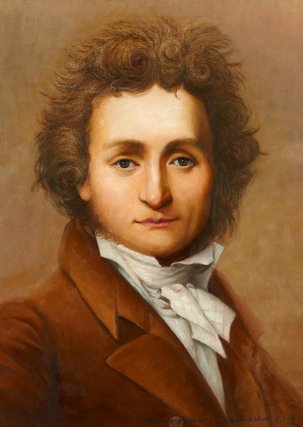Nicolò Paganini (1782–1840) – Biography

Paganini was born in Genoa in 1782 and was taught the violin first by his father, an amateur, and then by a violinist in the theatre orchestra and by the better-known player Giacomo Costa, under whose tuition he gave a public performance in 1794. The following year he played to the violinist and teacher Alessandro Rollo in Parma, and on the latter’s suggestion studied composition there under Paer.
After a return to Genoa and removal during the Napoleonic invasion, he settled in 1801 in Lucca, where, after 1805, he became violinist to the new ruler, the eccentric Princess Elisa Baciocchi, elder sister of Napoleon. At the end of 1809 he left to travel, during the next eighteen years, throughout Italy, winning a very considerable popular reputation.
In 1824 Paganini had started a liaison with a young singer, Adriana Bianchi, who bore him a son, Achille, the following year, a child to whom Paganini became very attached. Adriana Bianchi, however, was a troublesome partner, jealous and unpredictable in her behaviour, while Paganini, twice her age, was increasingly subject to illness.
In 1826 indisposition forced him to rest in Naples, where he wrote two concertos. It was only in January the following year that he was able to resume public performances. These continued, with appearances in Rome, Florence, Perugia and Leghorn, only to be interrupted by the need to look after Achillino, who had broken his leg and needed constant attention, and a recurrence of his own illness.
In 1828 he accepted an earlier invitation from Prince Metternich to visit Vienna, where he gave fourteen lucrative concerts. Public enthusiasm, in which Schubert also joined, was enormous, starting a fashion for everything à la Paganini. In the summer of 1828 he was able to reach a settlement with Adriana Bianchi, paying her off to end a highly unsatisfactory relationship and retaining custody of his son. After Vienna he travelled through Germany and to Poland, winning particular success in Berlin and Warsaw. In August 1829 he reached Frankfurt and established a base for himself there for the next eighteen months of continued tours, during which he visited Leipzig, now agreeing to play there, after earlier disagreements, and played for Goethe in Weimar.
The young Robert Schumann had heard Paganini play in Frankfurt in early April 1830, an experience to be reflected in his later music. There followed tours to Paris and, in May 1831, to Great Britain, where he gave 150 concerts in England, Scotland and Ireland over the following months.
His international career as a virtuoso ended in 1834, when, after an unsatisfactory tour of England, he returned again to Italy, to Parma, invited by the Archduchess Marie Luise of Austria to re-organize the court orchestra.
In 1837 he became involved in an unsuccessful and short-lived business venture in Paris, the Casino Paganini, which was intended to provide facilities equally for gambling and for music. From this and the continuing financial obligations that its failure brought, and with failing health, he took final refuge in Nice, where he died in May 1840.
